Man Accidentally Turned His Pet Cat Into A "Monster" After One Mistake
Cats aren’t generally known for being as silly and playful as dogs are. They have this persistent (albeit largely incorrect) stereotype of being aloof, cold, and lazy.
Any cat owner will happily bust those preconceived notions with stories about their own cats. Cat owners really love sharing about their cats, I know because not only do I have friends with many cat owners, but I am also one.
Many cats love to play with their owners, some like to chase or be chased, others like the usual cat toys like feather wands, and some even like to play fetch. (I have a fetch player and another who hasn’t quite figured out the return part of fetch.)
Some cats even enjoy a good old fashion wrestle, and can even manage to wrestle with their people without tearing them up. A Reddit user, Ser_Veaux accidentally discovered that his cat enjoyed roughhousing after play fighting with his dog.
In a post on r/TIFU, a Reddit community where Redditors share their mishaps for all to enjoy, mock or sympathize, Ser_Veaux shared how he found out his cat loves to roughhouse. And how that ended up turning her into a monster who aggressively demands rough and tumble play, and will not take ‘No’ for an answer.
The responses were mainly in solidarity with Ser_Veaux, sharing their own accidentally taught “bad” behaviors their cats have. Each one is as wholesome and funny as the next.
Keep scrolling to read the adorable story and some of the top comments.
This started a few months ago, but continues to this day
OP would never expect what he was getting himself into when he randomly thought, "let's roughhouse with the cat."
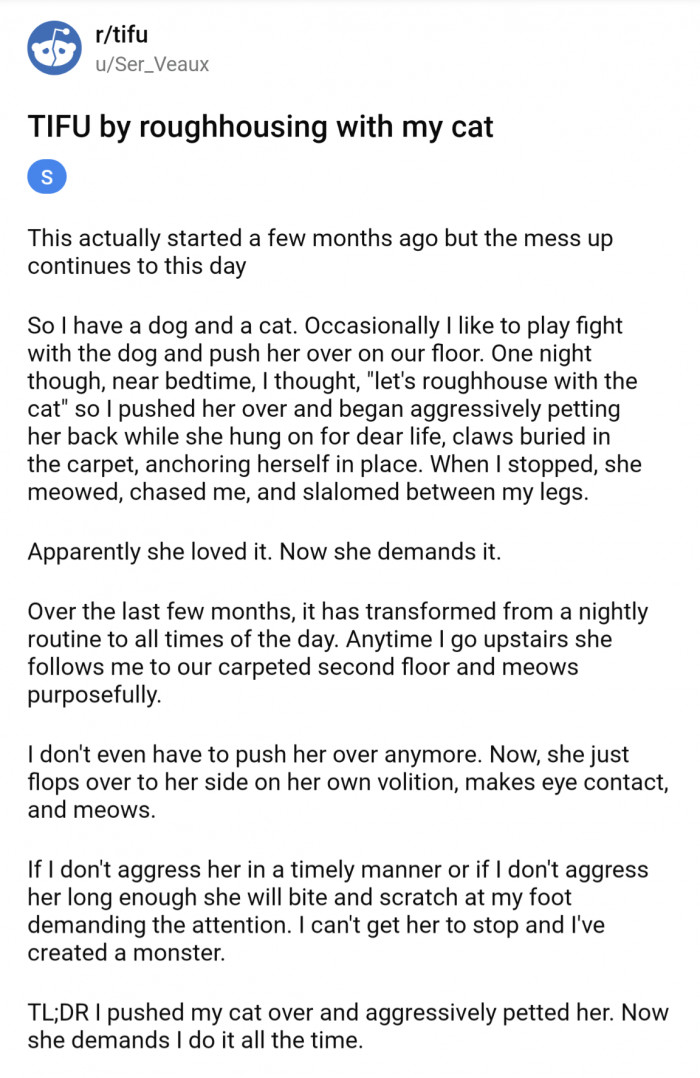
A real monster

Hangry cats aren't to be trifled with
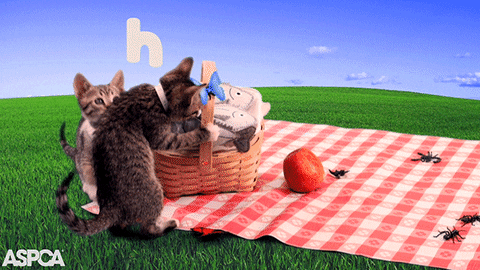
Understanding Cat Behavior
Understanding feline behavior is crucial for cat owners, particularly when problematic behaviors arise. Research from the Journal of Feline Medicine and Surgery emphasizes that many behavioral issues in cats stem from misunderstandings of their natural instincts.
In this case, the man's mistake may have inadvertently triggered a stress response in his cat, leading to what he describes as a 'monster' behavior. This highlights the importance of recognizing and respecting a cat's need for stimulation and security.
Understanding Behavioral Changes in Pets
Behavioral shifts in pets often reflect changes in their environment or interactions with their owners. Research from the Journal of Veterinary Behavior suggests that stress and anxiety in cats can lead to significant behavioral changes, including aggression.
Dr. Sarah Lynch, a feline behaviorist, notes that even minor alterations in a pet's routine can trigger these changes, highlighting the importance of stability and predictability in their lives.
Cats are quick to learn new things

Anything he can get his paws on to get some nummies
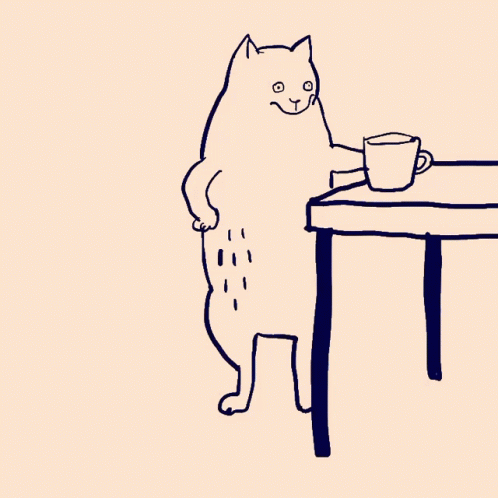
But extremely difficult to untrain

Moreover, the impact of environmental changes on a cat's behavior is significant. Studies indicate that cats are highly sensitive to their surroundings, and stressors can manifest as aggression or withdrawal.
Addressing these stressors through environmental enrichment, such as providing adequate playtime and safe spaces, can help restore a cat's well-being and mitigate unwanted behaviors.
Psychologists emphasize that pet owners need to be aware of their own behavior and its impact on their pets. Studies indicate that pets can pick up on their owners' emotional states, which can contribute to behavioral issues.
By maintaining a calm and positive demeanor, owners can help mitigate anxiety and promote a sense of safety for their pets, leading to more stable behavior patterns.
They're like little scientists testing gravity is all
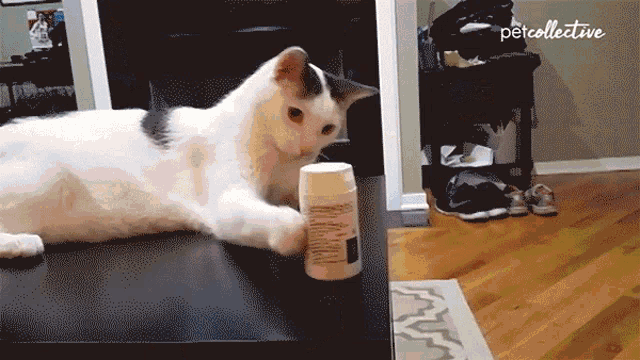
A monster for butt pats

AKA: Bum bongo

Cognitive and Emotional Needs of Cats
Cats, like many pets, have distinct cognitive and emotional needs that must be met for optimal health. Research indicates that a lack of mental stimulation can lead to behavioral problems, including aggression.
In this scenario, the owner's oversight may have created an environment that did not fulfill the cat's needs, resulting in a dramatic change in behavior. Understanding these needs is essential for effectively managing a cat's behavior.
The Importance of Routine in Pet Care
Establishing a consistent routine is essential for a pet's well-being. Research published in the Journal of Animal Science highlights how routines can help pets feel secure and reduce anxiety-related behaviors.
Dr. Mark Johnson, a veterinary psychologist, emphasizes that predictable routines provide pets with a sense of control, which can significantly improve their overall behavior and emotional health.
I'm glad somebody took the time to point out how freaking adorable this TIFU is

These kitties love spankings
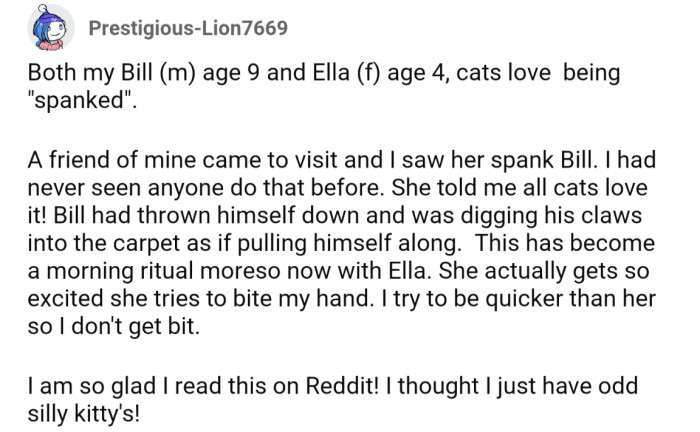
How I imagine Bill be like:
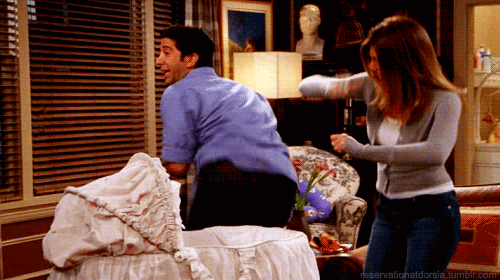
Additionally, the psychological concept of learned behavior plays a crucial role in pet training. A study from the University of Pennsylvania suggests that positive reinforcement can effectively shape and modify pet behavior.
In this case, redirecting the cat's behavior through positive reinforcement techniques, such as treats for desired actions, may help restore a more harmonious relationship between the pet and owner.
When changes occur in a pet's environment, such as a new owner or a different living situation, it can lead to feelings of instability and fear. Research from the American Psychological Association shows that animals, much like humans, thrive in stable environments where they feel safe.
Understanding this can help owners approach changes with sensitivity and care, ensuring that their pets have the emotional support they need during transitions.
This kitty truly loves belly rubs

It's (not) a trap!

Kitty patiently worked for years to train her humans to give her belly rubs

The Importance of Education in Pet Care
Education on pet care can significantly improve the relationship between owners and their pets. The American Veterinary Medical Association emphasizes that informed owners are better equipped to address behavioral issues effectively.
In this instance, the owner could benefit from resources on feline behavior to understand and respond appropriately to their cat's needs, facilitating a more positive experience for both.
Addressing Behavioral Issues Through Training
Training can be an effective way to address behavioral issues in pets. Studies indicate that positive reinforcement training techniques can lead to improved behavior and strengthened bonds between pets and their owners.
Dr. Lisa Brown, a certified animal behaviorist, advocates for using reward-based training methods, as they promote trust and cooperation, ultimately benefiting both the pet and owner.
Kitties have the softest bellies to rub
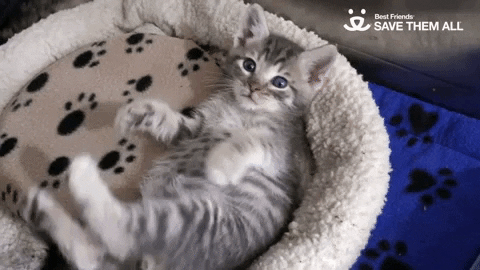
Cats definitely have their preferences
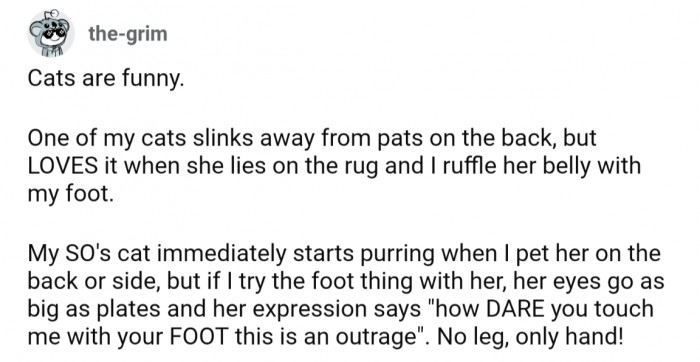
And they're not shy about letting you know
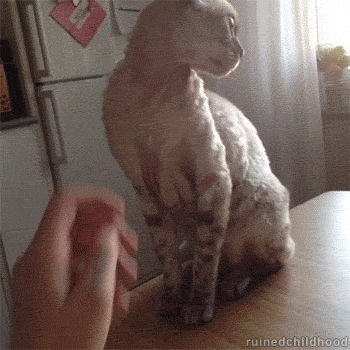
Furthermore, recognizing the signs of stress or anxiety in cats is vital for owners. Research shows that behavioral changes can indicate underlying emotional distress, and early intervention is essential.
Implementing strategies such as creating safe spaces or utilizing calming products can help alleviate stressors and foster a more positive environment for the cat.
Psychologists recommend that pet owners engage in self-reflection regarding their training strategies and their emotional responses to their pets' behavior. This self-awareness can help owners understand how their feelings may inadvertently affect their pets.
By cultivating emotional regulation skills, owners can create a more supportive environment that fosters positive behavioral changes in their pets.
Their kitty wants all the pets

All. The. Pets.
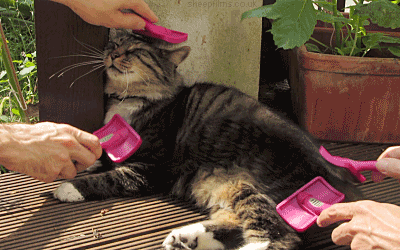
Black cats are truly a unique experience

Fostering a Positive Human-Animal Bond
Ultimately, fostering a positive bond between owner and pet requires understanding and patience. Studies in animal science indicate that a strong bond is built on mutual respect and the ability to meet each other's needs.
By prioritizing the well-being of the cat and addressing any behavioral issues with compassion, owners can create a nurturing environment that allows for growth and connection.
The Role of Emotional Support in Pet Care
Providing emotional support to pets is crucial for their well-being. Research indicates that animals who receive consistent emotional care exhibit fewer behavioral issues and greater overall happiness.
According to Dr. Emily Carter, a veterinary behaviorist, pets thrive in environments where they feel understood and supported, which reinforces the importance of emotional engagement in pet ownership.
I've never met a "normal" black cat
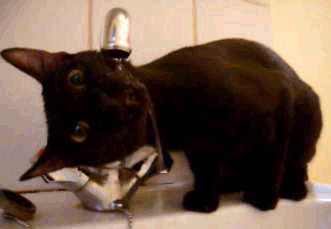
As if OP's misfortune wasn't enough of a warning

It's okay to learn from someone else's mistake

Creating a nurturing environment for pets involves recognizing their emotional needs and responding appropriately. Studies from veterinary psychology highlight that understanding a pet's behavior can lead to more effective care and training strategies.
By fostering a deeper connection with pets, owners can enhance their pets' well-being and overall behavior.
A curious nighttime routine

But it can be nice having some kitty company in the bathroom

A lot of people think you need to be gentle with cats because they're so small
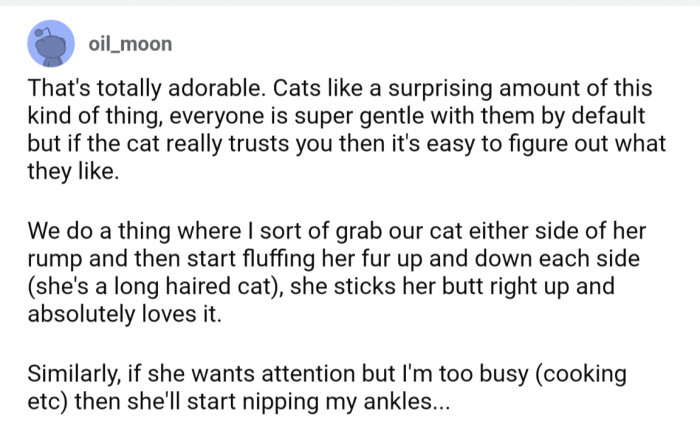
I wonder if fluffing up a cat feels like a mini-massage
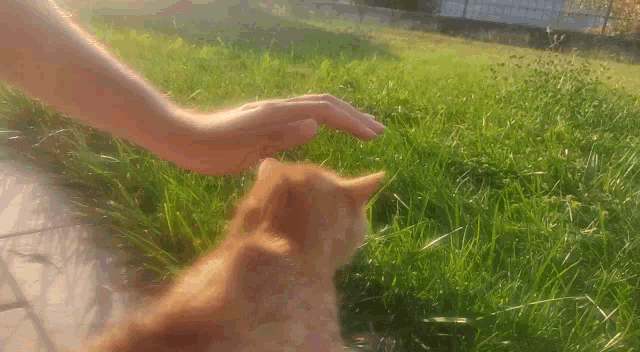
A cat’s love language?

Do all cats need/want roughhousing?
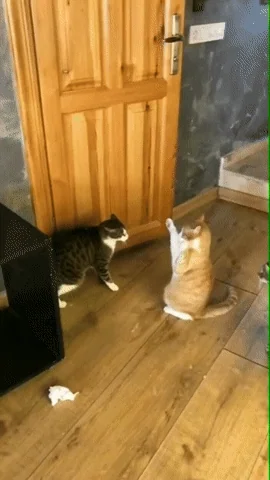
I've never heard of a ticklish cat

But it would make sense, I hate overly gentle touches too
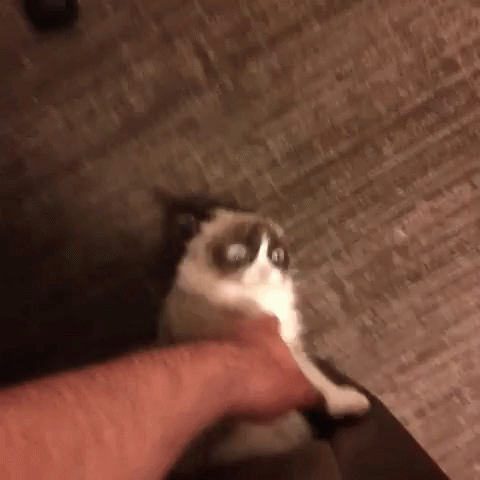
Clever cat

If it works, why change things
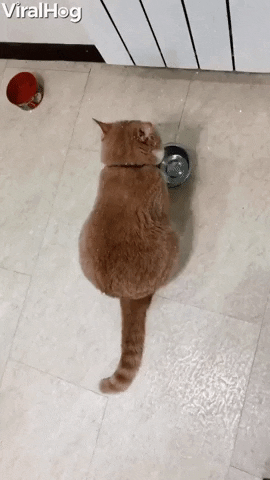
I can only imagine how much their kitty loves being able to smell all the things

Maybe not ALL the things...
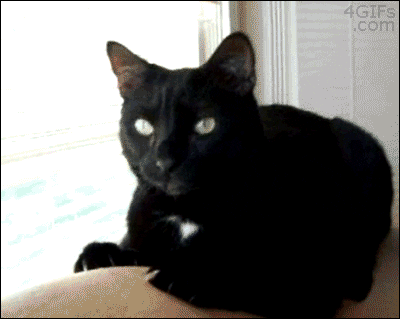
Ah yes, cat yodeling

There are many ways to help support your cat with yodeling
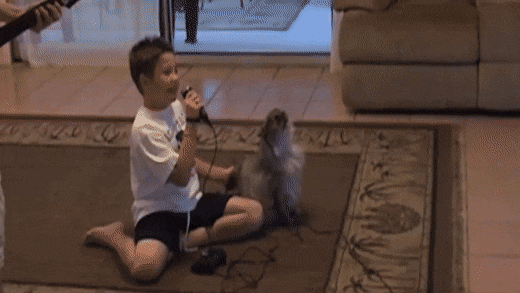
It's a bittersweet experience for this user

It can be a bit much to be constantly hunted
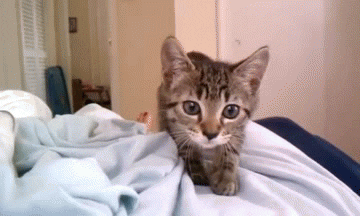
Mistakes were made

Make sure you have cat-safe plants!
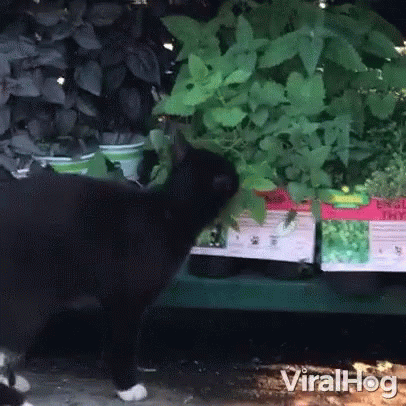
It can be surprising how quickly cats can pick up on things. According to Dr. John Gray, a relationship author and expert, "Cats are intelligent creatures that can learn and adapt, often rivaling dogs in their ability to be trained, but it ultimately depends on their willingness." You can find more insights on his website marsvenus.com. Do you have a cat that you’ve trained, whether purposefully or accidentally? Tell us all about them in the comments section below!
And be sure to share this with a fellow cat-lover.
Psychological Analysis
This situation illustrates the significant impact of human behavior on pet behavior. It’s crucial for pet owners to reflect on how their emotional states and routines influence their pets, fostering an environment where emotional support and stability are prioritized. Such awareness can lead to better outcomes for both pets and owners.
Analysis generated by AI
Analysis & Alternative Approaches
In conclusion, understanding the emotional and behavioral dynamics of pets is essential for effective care. Research emphasizes the importance of routine, emotional support, and training in fostering positive behavior and strengthening the human-animal bond.
By addressing these factors, pet owners can create nurturing environments that enhance their pets' well-being.
Analysis & Alternative Approaches
In conclusion, understanding the complex dynamics of cat behavior is essential for effective pet ownership. Research consistently shows that meeting a pet's cognitive and emotional needs can lead to improved behavior and a more fulfilling relationship.
By providing education and resources, owners can better navigate challenges and foster a positive human-animal bond.



